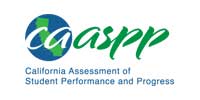 CALIFORNIA ASSESSMENT OF STUDENT PERFORMANCE AND PROGRESS (CAASPP) INSTITUTES
CALIFORNIA ASSESSMENT OF STUDENT PERFORMANCE AND PROGRESS (CAASPP) INSTITUTES
Sacramento County Office of Education
When you have just a few months time to plan and 6.2 million students in your schools, how do you train local educators to administer a new assessment system? Ask a county office of education to help.
The California Department of Education (CDE) has partnered with the Sacramento County Office of Education (SCOE) to conduct regional CAASPP Institutes for school, district and county office of education teams in fall 2015 and spring 2016.
“It’s difficult for the CDE to cover a state the size of California, so the partnership was very important,” Stickel said. “CDE sees the counties as a vital arm of this assessment work.”
Teams come away from the training with individual action plans they can implement locally. They also benefit from sharing strategies with other schools and districts.
Rachel Perry, Director of the Center for Student Assessment and Program Accountability at SCOE and the key force behind developing the training, said the central take-away of the Institutes was how to use CAASPP to improve teaching and learning. “That’s what we integrate throughout the entire institute: how you can use the system to modify your teaching,” she said.
Perry said, “People have been so focused on end-of-year summative assessments. We want them to take it
a step further, and use interim assessments and formative assessments in their classrooms on a daily basis to make sure kids are learning what they need to know.”
The fall session consists of two-day trainings held in 14 locations  throughout the state in October and November. The second session will be a one-day training in February at the same locations.
throughout the state in October and November. The second session will be a one-day training in February at the same locations.
Trainings are also being held for county office of education teams, covering the same information but in one-day sessions held in October 2015 and March 2016.
“We are holding these train-the-trainer sessions with just county offices of education so they have the information, and have all of the training materials we created so they can present locally,” Perry said.
Forty teams attended the October 14th session for Northern California county offices of education. In addition to a toolkit of materials they can duplicate for local trainings, they received very detailed speaker notes, so all presenters have the same talking points.
“It’s important that the information be presented consistently across the state,” Perry said.
“People really want to get it right, and they loved the toolkit,” Stickel said. In fact, just two days after the October 14th training, Stickel had heard about three COEs that had already scheduled their local trainings.
One piece of the training that’s very important to CDE and SCOE is having planning time integrated into the sessions. According to Perry, “Teams have a total of fours hours of planning time divided into four chunks over the two-day session. Each team had time to create a series of action steps, and then attach people to the steps and create a timeline, so they have a complete plan when they leave.”
These plans are important in order to avoid the implementation problems that can occur after professional development, when participants go back to their very busy jobs and can’t find the time to put what they’ve learned into action.
Stickel said more than 2,600 individuals applied for the 1,400 spots available for schools and districts, so they used a lottery system to select participants, after giving priority to district teams. The need for the Institute was clear. “There really is nothing else out there,” Stickel said.
Educational researcher Robert J. Marzano identified formative assessments as one of the “most powerful weapons in a teacher’s arsenal.” He stated that “an effective standards-based, formative assessment program can help to dramatically enhance student achievement throughout the K-12 system.” Though the CAASPP Institutes required a great deal of planning, collaboration and vetting of materials, the significant pay-off for both students and teachers will be well-worth the effort.
For More Information
- The official CAASPP portal has answers to questions about test administration, results reports, training, practice tests and more.
- California Department of Education has a comprehensive round-up of CAASPP resources and the latest updates.
- Sacramento County Office of Education has created family guides to the Smarter Balanced tests, sample principal newsletter blurbs and more.



